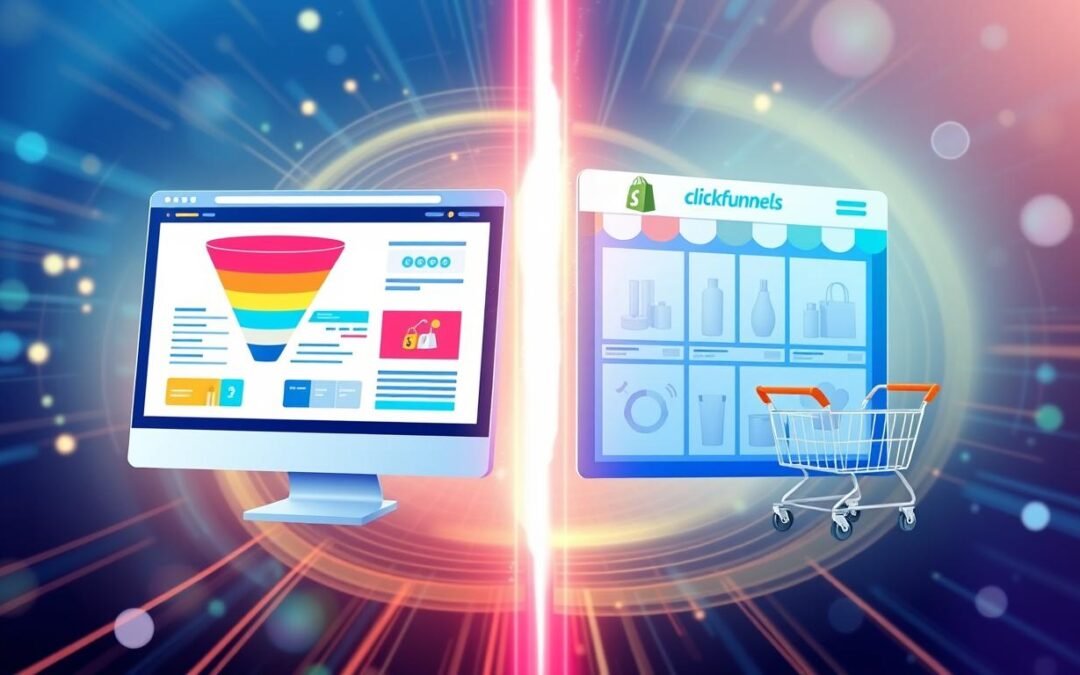Choosing the right platform for e-commerce can be tough. Many business owners face a tough decision between ClickFunnels and Shopify. ClickFunnels is great for creating sales funnels to boost digital product sales. On the other hand, Shopify is perfect for managing a full online store.
It’s important to know what each platform offers. This knowledge helps improve your online presence and sales. We’ll compare ClickFunnels and Shopify to help you decide.
Understanding ClickFunnels
ClickFunnels is a cloud-based platform for creating sales funnels. It aims to turn visitors into paying customers. It offers a user-friendly interface for designing marketing campaigns for both physical and digital products.
The latest version, ClickFunnels 2.0, offers new features for businesses of all sizes. It focuses on fast-loading pages, which is key for online success. Fast pages can lead to a 32% increase in sales.
ClickFunnels has a wide range of sales funnel templates. These templates are for different needs like product launches and membership sites. It also has CRM functionality for managing sales pipelines. This helps in nurturing customer relationships.
The platform integrates with popular email autoresponders and payment gateways. This makes transactions and customer communication smooth. It also has role-based access control for team collaboration. ClickFunnels makes designing and managing sales funnels easier for businesses.
| Feature | Description |
|---|---|
| Speed Optimization | Fast loading pages enhance user experience, reducing bounce rates. |
| Sales Funnel Templates | Offers over 100 pre-built sales funnels for various purposes, improving lead generation. |
| CRM Functionality | Built-in CRM for efficient sales pipeline management and customer relationships. |
| Team Collaboration | Role-based access control for secure and effective team operations. |
| Integrations | Supports various payment gateways and email marketing tools for seamless operations. |
Key Features of ClickFunnels
ClickFunnels is a top choice for creating sales funnels. It offers a wide range of features. Users get access to many funnel templates for different marketing goals.
These templates make it easy to start campaigns. This lets businesses focus on getting more customers, not on setting up.
ClickFunnels also has built-in A/B testing. This tool lets businesses try out different funnel parts. It helps find the best strategies by using real-time data.
By using this data, users can make their campaigns better. This leads to more customers and higher sales.
Another great feature is its marketing automation tools. These tools make the sales process smoother. Users can create membership sites and online courses.
This flexibility makes ClickFunnels perfect for entrepreneurs. It helps them get more leads and increase sales.
ClickFunnels Pricing and Plans
Understanding ClickFunnels pricing is key for anyone thinking about using it. It has a clear pricing model with plans for various business needs. The Basic plan starts at $147 a month, and the Complete plan is $297 a month. ClickFunnels might cost more than some competitors, but its sales-generating power makes it worth it.
ClickFunnels offers a free trial for 14 days. This lets you try it out without spending money right away. It’s a great choice for businesses looking for a strong marketing tool for digital products.
Here’s a detailed table of ClickFunnels subscription plans:
| Plan Type | Price per Month | Features |
|---|---|---|
| Basic Plan | $147 | Access to essential funnel-building features, customer support, and integrations |
| Platinum Plan | $297 | Enhanced features, including advanced automation and priority support |
| Share Funnel Plan | $19 | Specific for sharing funnels with other ClickFunnels users |
ClickFunnels is great for sales funnels but might not be the best for big e-commerce needs. Shopify is better for that. So, businesses should think about their goals and needs before choosing ClickFunnels or other options.
Understanding Shopify
Shopify is a top e-commerce platform for entrepreneurs and businesses. It was launched in 2006 and has become popular for its easy-to-use design. It also has many features for different business needs.
This online store builder has lots of customizable templates. Users can make unique storefronts. Shopify also offers SSL certificates for safe transactions, making customers feel secure.
Shopify is great for product management with its strong inventory tools. Users can handle product variants, track stock levels, and manage inventory for physical and digital goods. This is key for businesses to keep accurate stock and improve operations.
- Integrates with over 100 payment providers globally, simplifying online transactions.
- Offers built-in SEO tools that enhance store visibility on search engines.
- Enables multi-channel selling across social media and various online marketplaces.
- Provides thousands of apps to extend store functionality, enriching customization options.
- Includes basic blogging features for additional content marketing opportunities.
Shopify helps businesses with their daily tasks and gives them detailed analytics and reports. These insights are vital for making smart sales strategies and improving customer engagement.
Key Features of Shopify
Shopify has a wide range of features to make e-commerce easy for everyone. It has simple tools for managing products and inventory. This makes it easy to keep track of stock and product options. You can also customize your online store to look great.
Shopify is great at handling payments. It works with many payment gateways like Stripe, PayPal, and Square. It also has its own payment system, Shopify Payments. This means businesses can accept many different payment types.
Shopify also has tools to help with SEO. These tools help improve your store’s visibility online. You can optimize product pages, meta descriptions, and URLs. This helps your store rank better in search results.
The platform also has a big app store. This lets you add more features with third-party apps. This makes Shopify even more useful for your business.
Shopify makes shipping easy too. It has tools to help you manage and fulfill orders. Plus, there’s 24/7 customer support. This means help is always available, making Shopify a great choice for e-commerce.
The following table summarizes the key features of Shopify:
| Feature | Description |
|---|---|
| Product Management | Easy tools for managing product inventory and variations. |
| Payment Processing | Supports multiple gateways including Shopify Payments, Stripe, PayPal, and Square. |
| SEO Tools | Advanced tools for optimization, enhance visibility on search engines. |
| Extensive App Store | Numerous plugins and integrations to customize the platform’s capability. |
| Shipping Management | Efficient options for managing and fulfilling orders. |
| 24/7 Customer Support | Assistance available around the clock for all users. |
Shopify Pricing and Plans
When picking a platform for an online store, Shopify’s pricing is key. It has plans for all, starting at $29 a month for the Basic Plan. This plan includes an online store, product management, and basic reports.
The Shopify Plan, at $79 a month, offers more. You get unlimited products and advanced reports. The Advanced Plan, at $299, is for big businesses. It has advanced reports and professional checkout.
Shopify also offers a free trial for 14 days. This lets businesses try out Shopify without committing. It’s a great way to see if Shopify fits their needs.
Shopify’s app store is huge, unlike ClickFunnels’. It has thousands of apps to make your store better. This means businesses can find the tools they need to grow online.
Shopify beats ClickFunnels in customer support, with help available 24/7. It also has a mobile app for Android and iPhone. This makes it easy to manage your store anywhere, anytime.
The table below shows the main differences between Shopify and ClickFunnels:
| Feature | ClickFunnels | Shopify |
|---|---|---|
| Starting Pricing | $97/month | $29/month |
| Free Trial | No | 14 days |
| Support Availability | Weekdays 9 am to 5 pm | 24/7 |
| Mobile App | No | Available for Android and iPhone |
| Number of Apps in Store | Limited | Thousands |
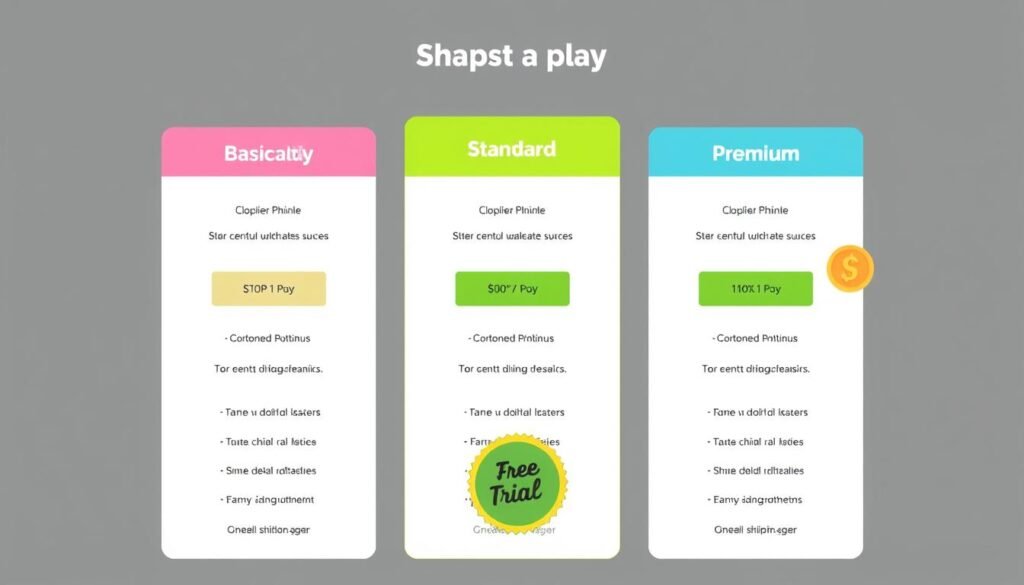
ClickFunnels vs Shopify: Key Differences
ClickFunnels and Shopify are two big names in the online world. They offer different things, which is important to know when choosing one. Each platform has its own strengths and weaknesses.
Focus on Sales Funnels vs E-Commerce Store
ClickFunnels is all about sales funnels. It makes it easy to create them, which is great for lead generation and conversion optimization. You can design funnels for your marketing campaigns.
On the other hand, Shopify is all about e-commerce. It has tools for managing big inventories and tracking stock. It also works with many payment gateways for different regions.
User Experience and Ease of Use
Both platforms are easy to use, but in different ways. ClickFunnels is easy for beginners to start with. It has simple templates and guides to help you get started.
Shopify is also user-friendly but might be harder to learn because of all its features. Its app store lets you customize and enhance your store for a better experience.
Sales Funnel Capabilities
ClickFunnels is known for its top-notch sales funnel tools. It helps in generating leads and improving conversion rates. The platform’s drag-and-drop interface makes it easy to create complex funnels, even for those without coding skills.
A/B testing is supported, which means you can tweak your funnels for better results. Users often highlight ClickFunnels’ excellent customer service and vast resources. These help a lot in mastering the platform.
Lead Generation and Conversion Techniques
ClickFunnels is all about generating leads. It lets you create personalized and automated email funnels. This way, you can engage with your audience more effectively.
Many entrepreneurs choose ClickFunnels because it boosts their marketing efforts. The high conversion rates prove its effectiveness.
Marketing Tools and Automation
ClickFunnels has a wide range of marketing automation tools. It includes webinar funnels and affiliate program management. These tools are more advanced than what most platforms offer.
For targeted campaigns, ClickFunnels gives you detailed insights into your funnel’s performance. This lets you adjust your strategies based on real-time data. Shopify might cover basic marketing needs, but ClickFunnels offers more automation.
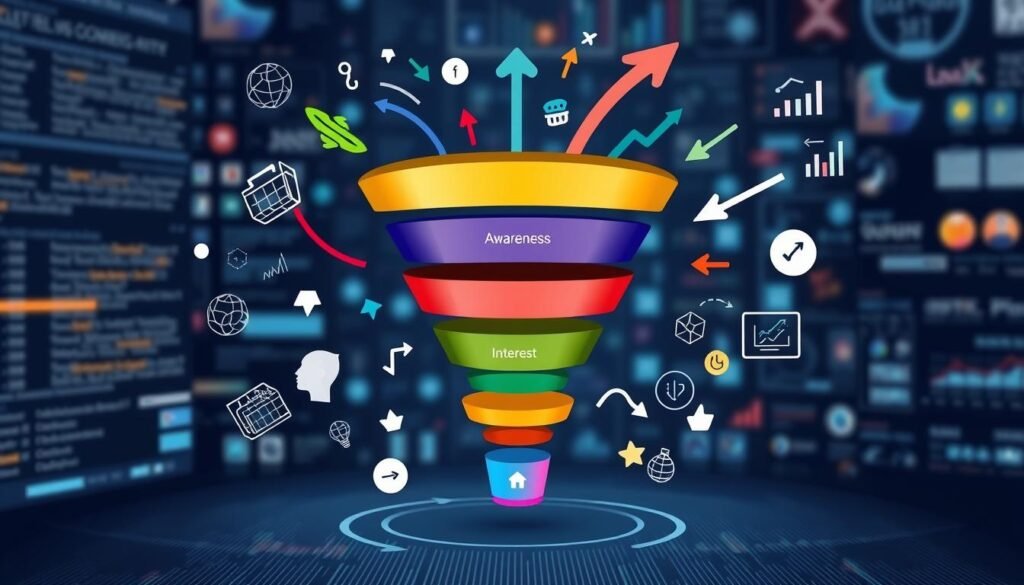
| Feature | ClickFunnels | Shopify |
|---|---|---|
| Lead Generation Tools | Advanced with email funnels | Basic customer management |
| Conversion Optimization | A/B testing available | No dedicated A/B testing |
| Sales Funnel Creation | Drag-and-drop interface | Not primary focused on funnels |
| Marketing Automation | Comprehensive tools offered | Basic integration available |
| Customer Support | Robust and accessible | Standard support available |
E-Commerce Store Management
Running an online store is easier with Shopify’s e-commerce management. It lets users add photos, descriptions, and prices to products easily. This makes it simple to list items, from single products to over 100.
Shopify also offers great tools for managing inventory. It’s perfect for sellers of physical products, handling big orders smoothly. Plus, it works with many apps, including shipping services like UPS and FedEx, and accounting tools like QuickBooks and Xero.
ClickFunnels is great for creating sales funnels but lacks Shopify’s e-commerce tools. It focuses on marketing and lead generation, with features like funnel templates and analytics. This might be a drawback for those mainly looking for e-commerce features.
Both platforms offer trial periods to try before buying. Shopify is easy to use, even for those without web design skills. This makes it a good choice for new online businesses.
| Feature | Shopify | ClickFunnels |
|---|---|---|
| Focus | E-Commerce | Sales Funnels |
| Product Listings | Up to 100+ products | Basic products in funnels |
| Inventory Management | Comprehensive tracking | Limited capabilities |
| Shipping Integration | UPS, FedEx, etc. | Not focused on shipping |
| Initial Cost | Starts at $39/month | Starts at $147/month |
Product Catalog and Inventory Management
Managing a product catalog is different for Shopify and ClickFunnels. Shopify has a strong catalog for many products. It has tools for tracking inventory, editing in bulk, and organizing products.
ClickFunnels, on the other hand, focuses more on sales funnels. It has basic product tracking but lacks Shopify’s depth. So, for detailed inventory management, Shopify is better.
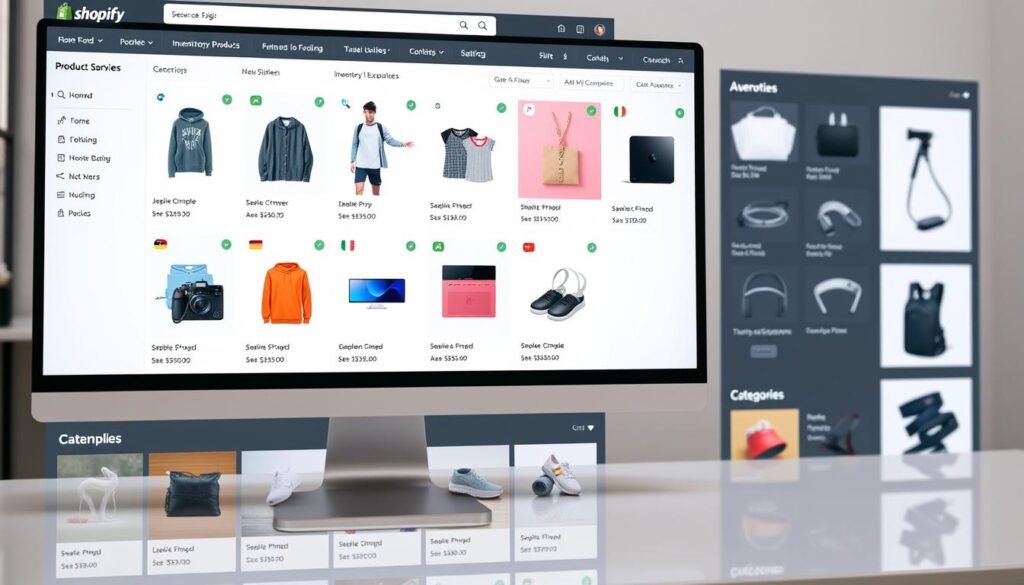
Here’s a table comparing Shopify’s product catalog and ClickFunnels’ inventory features:
| Feature | Shopify Product Catalog | ClickFunnels Inventory Features |
|---|---|---|
| Inventory Tracking | Comprehensive, real-time updates | Basic tracking within sales funnels |
| Bulk Editing | Available for faster updates | Not available |
| Product Categorization | Advanced categorization options | Limited categorization |
| Support for Diverse Products | Supports unlimited products | Limited support within funnels |
| Integration Capabilities | Robust App Store for additional tools | Integrations mainly for marketing purposes |
Shopify is a full e-commerce platform for all businesses. ClickFunnels is best for creating sales funnels, not detailed product management.
Shipping and Fulfillment Options
Shopify shines when it comes to shipping and fulfillment. It offers integrations with big carriers like UPS, FedEx, and USPS. This lets businesses automate shipping rates during checkout, making it better for customers.
Shopify’s Fulfillment Network also makes order processing smoother. It updates orders and tracking automatically for customers.
ClickFunnels is great for creating sales funnels but lacks in shipping features compared to Shopify. It mainly helps with sales, not logistics. While it does connect with third-party logistics, it’s not enough for complex shipping needs.
- Shopify has free shipping options and custom rates for international orders, helping businesses reach a global audience.
- It also lets users set up automated stock notifications, helping manage inventory well.
- ClickFunnels is more geared towards service-based businesses, so its shipping features aren’t as useful for e-commerce.
Both platforms can connect with email marketing tools to improve customer communication during shipping. But for businesses focusing on efficient shipping, Shopify is the better choice. It’s perfect for those with lots of products and complex shipping needs.
Integrations and Extensibility
ClickFunnels and Shopify both have third-party integrations to meet different user needs. ClickFunnels shines in marketing automation, helping businesses streamline sales. It lets users add tools like Mailchimp and AWeber for better lead generation.
Shopify, on the other hand, boasts a huge Shopify app ecosystem. It has thousands of apps for logistics, accounting, and more. This variety lets entrepreneurs tailor their e-commerce sites to their needs, improving operations and customer service.
Here’s a quick look at what ClickFunnels and Shopify offer in terms of integrations:
| Feature | ClickFunnels | Shopify |
|---|---|---|
| Focus | Sales funnels and marketing automation | E-commerce management and product sales |
| Marketing Tool Integrations | Mailchimp, AWeber, various funnel builders | Oberlo, Automizely, 100+ payment gateways |
| App Ecosystem Size | Limited focused integrations | Over 3,000 apps available |
| Business Scalability | Optimized for lead generation | Comprehensive store management |
| User Experience | Designed for marketers | Tailored for e-commerce businesses |
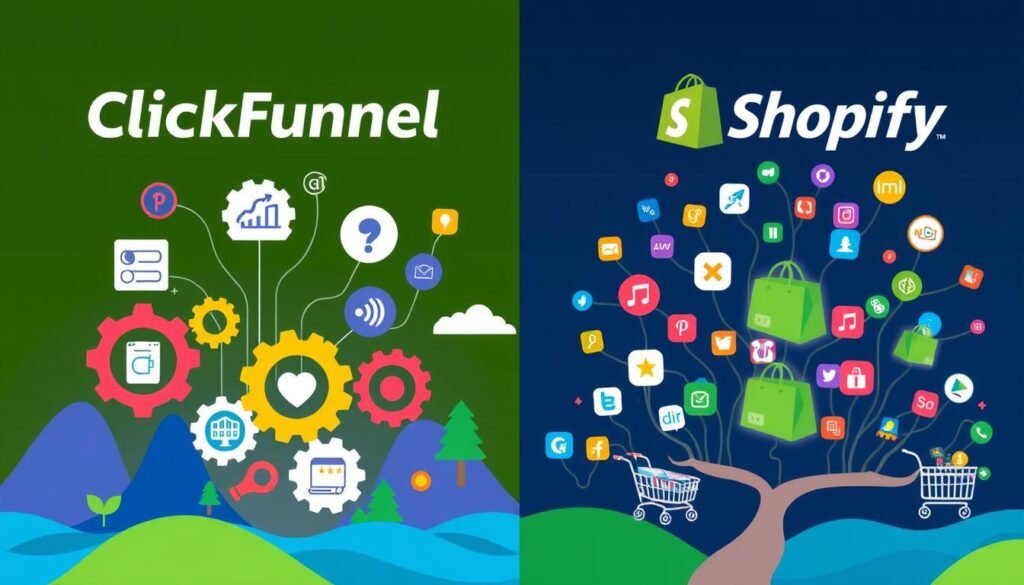
Conclusion
When comparing ClickFunnels and Shopify, the choice depends on what your business needs. ClickFunnels is great for those who want to focus on selling and lead generation. It has tools like A/B testing to help increase sales.
Shopify, on the other hand, is a full-service e-commerce platform. It has thousands of apps for managing everything from inventory to customer relationships. This makes it perfect for businesses that need to handle all aspects of their online store.
Choosing the right platform is key to your business’s success. Knowing what each platform offers helps entrepreneurs make the best choice. This choice can lead to long-term success in the online market.
FAQ
What is the primary function of ClickFunnels?
How does Shopify differ from ClickFunnels?
Are there any free trials available for these platforms?
What kind of pricing structure does ClickFunnels have?
What key features does Shopify provide for online stores?
Can ClickFunnels support any advanced marketing features?
What types of businesses is Shopify best suited for?
How do shipping options compare between ClickFunnels and Shopify?
Are both platforms compatible with third-party applications?
Which platform should I choose for my business?
Source Links
- https://www.sparq.ai/blogs/clickfunnels-vs-shopify
- https://cmsminds.com/blog/clickfunnels-vs-shopify/
- https://www.clickfunnels.com/blog/clickfunnels-2-0-vs-shopify/
- https://www.funnelsecrets.us/clickfunnels-vs-shopify/
- https://desku.io/compare/clickfunnels-vs-shopify/
- https://www.stylefactoryproductions.com/blog/clickfunnels-vs-shopify
- https://passionates.com/clickfunnels-vs-shopify-an-unbiased-comparison/
- http://fittle-project.com/clickfunnels-vs-shopify/
- https://www.mageplaza.com/blog/shopify-solution/clickfunnels-vs-shopify.html
- https://www.linkedin.com/pulse/clickfunnels-vs-shopify-which-better-selling-online-style-factory-9pixe
- https://www.channelwill.com/blogs/clickfunnels-vs-shopify/
- https://www.updimes.com/clickfunnels-vs-shopify/
- https://pagefly.io/blogs/shopify/clickfunnels-vs-shopify
- https://ecommerce.folio3.com/blog/clickfunnels-vs-shopify/
- https://www.joinsecret.com/compare/clickfunnels-vs-shopify
- https://wpwebinfotech.com/blog/clickfunnels-vs-shopify/
- https://seosorcerer.com/clickfunnels-vs-shopify/
- https://boostifythemes.com/clickfunnels-vs-shopify/
- https://nextsky.co/blogs/shopify/shopify-vs-clickfunnels?srsltid=AfmBOoqDhMi4oOO5LEFoQ7BFEex9C4XqsUUUPQ5WGdoDTxFEug72C1fL
- https://silverbulletpros.com/marketing/shopify-vs-clickfunnels/
- https://www.popularaitools.ai/blog/clickfunnels-vs-shopify-1065c
- https://www.cleverence.com/articles/shopify/shopify-vs-clickfunnels-comparing-e-commerce-platforms/
- https://magenest.com/en/clickfunnels-vs-shopify/?srsltid=AfmBOooz8Cf6Py1Wy7kqHAvLMb5V90TKwb3POB1BoEa9A45LNJ30i3xX

